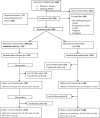Mobile phone reminders and peer counseling improve adherence and treatment outcomes of patients on ART in Malaysia: A randomized clinical trial
- PMID: 28520768
- PMCID: PMC5433794
- DOI: 10.1371/journal.pone.0177698
Mobile phone reminders and peer counseling improve adherence and treatment outcomes of patients on ART in Malaysia: A randomized clinical trial
Abstract
Background: Adherence to treatment remains the cornerstone of long term viral suppression and successful treatment outcomes among patients receiving Antiretroviral Therapy (ART).
Objective(s): Evaluate the effectiveness of mobile phone reminders and peer counseling in improving adherence and treatment outcomes among HIV positive patients on ART in Malaysia.
Methods: A single-blind, parallel group RCT conducted in Hospital Sungai Buloh, Malaysia in which 242 adult Malaysian patients were randomized to intervention or control groups. Intervention consisted of a reminder module delivered through SMS and telephone call reminders by trained research assistants for 24 consecutive weeks (starting from date of ART initiation), in addition to adherence counseling at every clinic visit. The length of intended follow up for each patient was 6 months. Data on adherence behavior of patients was collected using specialized, pre-validated Adult AIDS Clinical Trial Group (AACTG) adherence questionnaires. Data on weight, clinical symptoms, CD4 count and viral load tests were also collected. Data was analyzed using SPSS version 22 and R software. Repeated measures ANOVA, Friedman's ANOVA and Multivariate regression models were used to evaluate efficacy of the intervention.
Results: The response rate after 6 months follow up was 93%. There were no significant differences at baseline in gender, employment status, income distribution and residential location of respondents between the intervention and control group. After 6 months follow up, the mean adherence was significantly higher in the intervention group (95.7; 95% CI: 94.39-96.97) as compared to the control group (87.5; 95% CI: 86.14-88.81). The proportion of respondents who had Good (>95%) adherence was significantly higher in the intervention group (92.2%) compared to the control group (54.6%). A significantly lower frequency in missed appointments (14.0% vs 35.5%) (p = 0.001), lower viral load (p = 0.001), higher rise in CD4 count (p = 0.017), lower incidence of tuberculosis (p = 0.001) and OIs (p = 0.001) at 6 months follow up, was observed among patients in the intervention group.
Conclusion: Mobile phone reminders (SMS and telephone call reminders) and peer counseling are effective in improving adherence and treatment outcomes among HIV positive patients on ART in Malaysia. These findings may be of potential benefit for collaborative adherence planning between patients and health care providers at ART commencement.
Conflict of interest statement
Similar articles
-
Sociodemographic profile and predictors of outpatient clinic attendance among HIV-positive patients initiating antiretroviral therapy in Selangor, Malaysia.Patient Prefer Adherence. 2017 Jul 27;11:1273-1284. doi: 10.2147/PPA.S141609. eCollection 2017. Patient Prefer Adherence. 2017. PMID: 28794617 Free PMC article.
-
Effect of mobile telephone reminders on treatment outcome in HIV: evidence from a randomised controlled trial in India.BMJ. 2014 Oct 24;349:g5978. doi: 10.1136/bmj.g5978. BMJ. 2014. PMID: 25742320 Free PMC article. Clinical Trial.
-
Supporting patient adherence to antiretrovirals using mobile phone reminders: patient responses from South India.AIDS Care. 2012;24(5):612-7. doi: 10.1080/09540121.2011.630357. Epub 2011 Dec 7. AIDS Care. 2012. PMID: 22150088
-
A Systematic Review of Digital Interventions to Improve ART Adherence among Youth Living with HIV in sub-Saharan Africa.AIDS Res Treat. 2022 Sep 26;2022:9886306. doi: 10.1155/2022/9886306. eCollection 2022. AIDS Res Treat. 2022. PMID: 36199816 Free PMC article. Review.
-
Adherence in AIDS clinical trials: a framework for clinical research and clinical care.J Clin Epidemiol. 1997 Apr;50(4):385-91. doi: 10.1016/s0895-4356(97)00041-3. J Clin Epidemiol. 1997. PMID: 9179096 Review.
Cited by
-
Effectiveness of peer-supervision on pediatric fever illness treatment among registered private drug sellers in East-Central Uganda: An interrupted time series analysis.Health Sci Rep. 2021 May 7;4(2):e284. doi: 10.1002/hsr2.284. eCollection 2021 Jun. Health Sci Rep. 2021. PMID: 33977166 Free PMC article.
-
Does mobile phone instructional video demonstrating sputum expectoration improve the sputum sample quality and quantity in presumptive pulmonary TB cases? Protocol for a prospective pragmatic non-randomised controlled trial in Karnataka state, India.BMJ Open. 2020 Mar 4;10(3):e032991. doi: 10.1136/bmjopen-2019-032991. BMJ Open. 2020. PMID: 32139483 Free PMC article.
-
Effectiveness of inbuilt cell phone reminders in chronic medication compliance.S Afr Fam Pract (2004). 2025 Apr 29;67(1):e1-e8. doi: 10.4102/safp.v67i1.6031. S Afr Fam Pract (2004). 2025. PMID: 40336435 Free PMC article.
-
Extending beyond Policy: Reaching UNAIDS' Three "90"s in Malawi.Front Public Health. 2018 Mar 16;6:69. doi: 10.3389/fpubh.2018.00069. eCollection 2018. Front Public Health. 2018. PMID: 29600244 Free PMC article.
-
A multi-country cross-sectional study to assess predictors of daily versus on-demand oral pre-exposure prophylaxis in youth from South Africa, Uganda and Zimbabwe.J Int AIDS Soc. 2022 Aug;25(8):e25975. doi: 10.1002/jia2.25975. J Int AIDS Soc. 2022. PMID: 36002910 Free PMC article.
References
-
- Malaysia 2014 Global AIDS Response Country Progress Report.
-
- Preininger L, Cantwell-McNelis K, James C, Sullivan MC, Szabo S, Bincsik A. Long term Medication adherence in patients receiving antiretroviral therapy. Curr HIV Res. 2011; 9: 253–255. doi: 10.2174/157016211796320351 - DOI - PubMed
-
- World Health Organization. ‘Prioritizing Second-Line Anti-retroviral Drugs for Adults and Adolescents: A Public Health Approach’. Report of a WHO Working Group Meeting, 21–22 May, 2007.
-
- Fairly CK, Permana A, Read TRH. Long term utility of measuring adherence by self-report compared with pharmacy record in a routine clinic setting. HIV Med. 2005; 6: 366–369. doi: 10.1111/j.1468-1293.2005.00322.x - DOI - PubMed
-
- Jani AA. Adherence to HIV treatment regimens: recommendations for best practices, 2004, pp. 3–72. Available from http://www.alpha.org/ppp/hiv
Publication types
MeSH terms
LinkOut - more resources
Full Text Sources
Other Literature Sources
Medical
Research Materials
Miscellaneous


